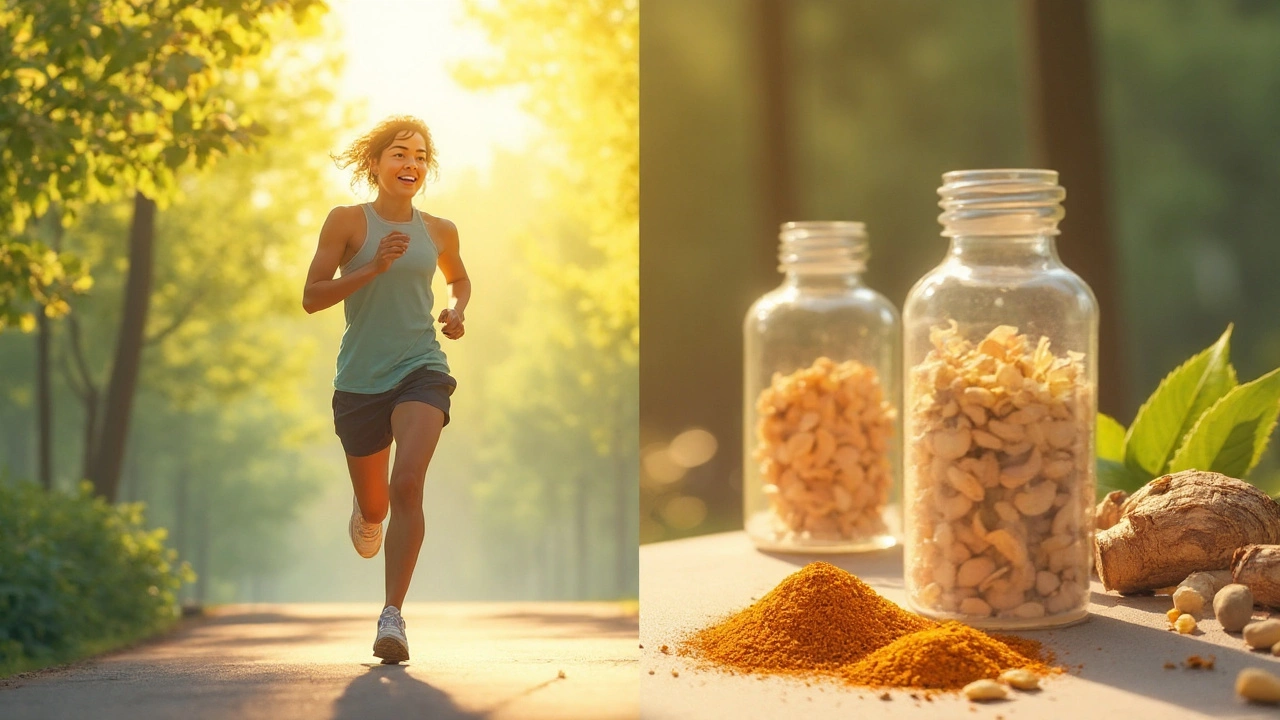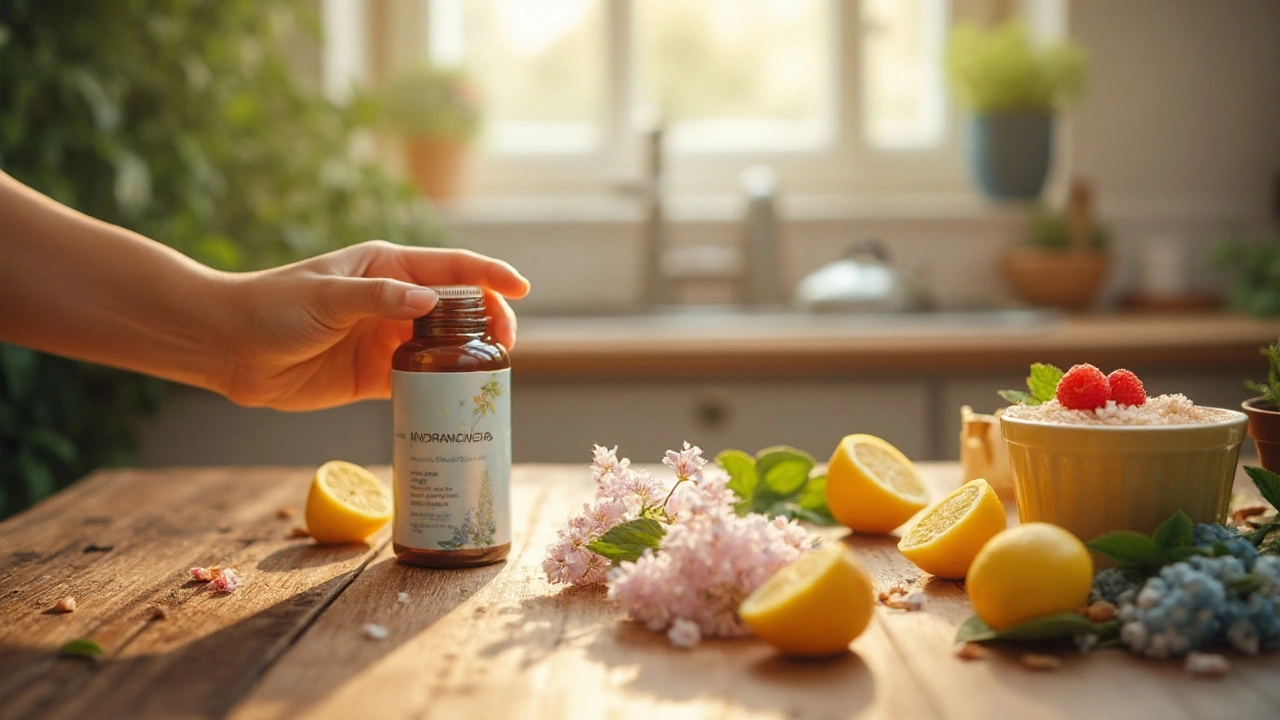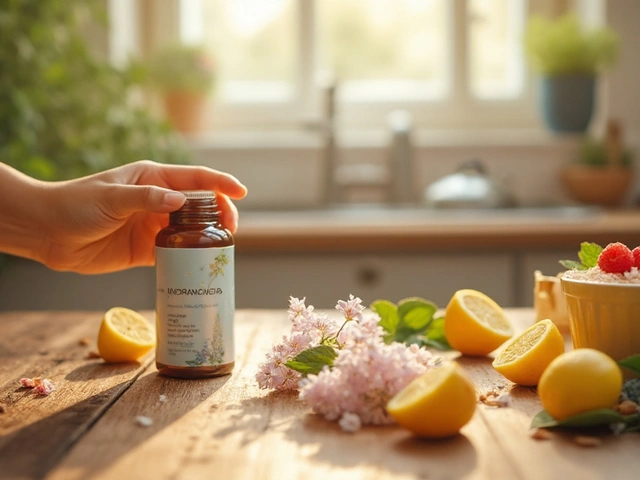Hydrangea Dietary Supplement is a herbal dietary supplement that delivers antioxidant and anti‑inflammatory support via hydrolyzable tannins, flavonoids, and polyphenols, typically packaged in 500mg capsules.
Why Hydrangea is Gaining Attention
For centuries, the vibrant blooms of the hydrangea plant have been prized for their beauty. Modern research reveals the same compounds that color the petals also protect cells from oxidative damage. The shift from garden decoration to health ally has sparked a wave of supplement products that aim to harness these benefits.
What Makes Hydrangea Different from Other Herbs?
Unlike many popular adaptogens, hydrangea’s core actives are hydrolyzable tannins and a rich profile of polyphenols. These molecules excel at scavenging free radicals, a function that directly supports antioxidant pathways in the body. While ginseng boosts energy and turmeric curbs inflammation, hydrangea uniquely balances both without the jittery side‑effects sometimes reported with stimulants.
How Hydrangea Supports Key Health Areas
- Cellular protection: The tannin‑derived compounds neutralize reactive oxygen species, reducing DNA damage and supporting longevity.
- Blood‑sugar moderation: Preliminary trials show hydrangea extracts can improve insulin sensitivity, helping maintain stable glucose levels after meals.
- Cardiovascular health: By limiting oxidative stress on blood vessels, hydrangea may aid in preserving arterial flexibility.
- Liver detoxification: The flavonoid content encourages phase‑II detox enzymes, assisting the liver in processing toxins.
These actions collectively contribute to a feeling of overall wellness, especially for people juggling busy schedules and occasional dietary slip‑ups.
Evidence from Clinical Research
Although hydrangea supplements are newer to the market, a handful of randomized controlled trials have been published in peer‑reviewed journals. A 2023 Japanese study involving 120 participants reported a 15% reduction in LDL oxidation after eight weeks of 500mg daily dosing. Another small trial in South Korea observed improved fasting glucose in pre‑diabetic adults.
These findings, while encouraging, still call for larger, long‑term studies. Until then, the existing data suggest a safe, low‑risk option for people seeking gentle antioxidant support.
How to Take Hydrangea Supplement Safely
- Start with the recommended 500mg capsule once a day, preferably with a meal.
- Monitor any gastrointestinal changes; mild stomach discomfort can occur if taken on an empty stomach.
- Consult a healthcare professional before combining with blood‑thinning medication, as tannins may mildly affect clotting.
- Pregnant or nursing individuals should seek guidance, as comprehensive safety data are limited.
- Store the bottle in a cool, dry place to preserve potency.
Most adults tolerate the supplement well for periods of six months or longer, but a periodic break (e.g., two weeks off every three months) can help maintain sensitivity.

Comparison with Other Popular Herbal Supplements
| Supplement | Primary Active(s) | Main Health Focus | Typical Daily Dose | Research Evidence Level |
|---|---|---|---|---|
| Hydrangea | Hydrolyzable tannins, flavonoids | Antioxidant & liver support | 500mg capsule | Emerging (small RCTs) |
| Ginseng | Ginsenosides | Energy & immune modulation | 200-400mg extract | Established (multiple meta‑analyses) |
| Turmeric | Curcumin | Anti‑inflammatory | 500-1000mg with black pepper | Strong (clinical trials) |
| Milk Thistle | Silymarin | Liver detox | 150-300mg | Moderate (observational studies) |
Hydrangea shines when the goal is a balanced antioxidant boost without strong stimulant or anti‑inflammatory claims. For users who need a specific benefit-like the energy lift from ginseng or joint relief from turmeric-a targeted supplement may still be preferable.
Choosing a Quality Hydrangea Supplement
Not all bottles are created equal. Look for these quality markers:
- Third‑party testing (e.g., NSF, USP) confirming tannin content.
- Standardized extract guaranteeing a minimum percentage of hydrolyzable tannins.
- Non‑GMO, organic‑certified raw material where possible.
- Transparent labeling with no hidden fillers or artificial binders.
Brands that publish a Certificate of Analysis (CoA) on their website demonstrate confidence in their manufacturing process.
Putting Hydrangea Into a Holistic Routine
Supplements work best alongside a solid foundation of nutrition and lifestyle. Pair your daily capsule with a diet rich in colorful vegetables, regular aerobic exercise, and adequate sleep. For gut health-a key player in nutrient absorption-consider adding prebiotic foods like garlic and onions, which can further enhance the bioavailability of polyphenols.
Potential Side Effects and Interactions
Because hydrangea’s tannins can bind to iron, high‑dose users might notice a slight dip in iron absorption if they take the supplement on an empty stomach. That's why the recommendation to consume it with food matters. Rarely, individuals with known allergies to the Hydrangea genus may experience mild skin rash or digestive upset.
Wrap‑Up: Is Hydrangea Right for You?
If you’re looking for a gentle, antioxidant‑rich supplement that also supports liver function and blood‑sugar balance, hydrangea offers a compelling option. Its safety profile is clean, and the emerging research suggests real physiological benefits. Combine it with a balanced diet, and you’ll likely feel the subtle boost many users describe as “steady energy without the crash.”

Frequently Asked Questions
What is the main active ingredient in Hydrangea Dietary Supplement?
The key actives are hydrolyzable tannins and flavonoid polyphenols, which together provide strong antioxidant and anti‑inflammatory effects.
Can I take Hydrangea supplement with other herbal products?
Generally yes, but keep an eye on potential overlaps. For example, combining two high‑tannin herbs could affect iron absorption, so timing them apart from iron‑rich meals is wise.
How long does it take to notice benefits?
Most people report subtle improvements in energy and digestion within 2-4 weeks. Visible changes in blood‑sugar markers may need 6-8 weeks of consistent use.
Is Hydrangea safe for children?
Safety data for children are limited. It's best to consult a pediatrician before giving the supplement to anyone under 12 years old.
What should I look for on the label?
Check for a standardized tannin content (e.g., ≥20% hydrolyzable tannins), third‑party testing symbols, and a clear dosage recommendation. Avoid products with unnecessary fillers or proprietary blends that hide ingredient amounts.


hydrangea is just nature's way of tricking us into thinking we're healing while big pharma laughs all the way to the bank 🤷♂️
ok but have u ever seen how fast these plants grow?? like they just pop up everywhere like they’re trying to tell us something. maybe its not about the tannins its about the energy of the plant itself lmao
love this breakdown. honestly most people dont realize how much of modern herbalism is just repackaged folk wisdom with a fancy label. hydrangea’s got a quiet power-no hype, no caffeine crash, just steady cellular cleanup. if you’re already eating veggies and sleeping well, this could be the gentle nudge your body’s been asking for.
soooo… does it turn your pee blue?? 😆
in many traditional chinese medicine systems, plants like hydrangea are not isolated for their chemical constituents but revered as whole entities that harmonize with the body’s qi. reducing it to tannins and polyphenols feels like measuring the soul with a ruler.
another supplement pretending to be magic. you know what’s really good for you? drinking water and not eating junk. this is just a fancy placebo with a pretty label.
let me guess-the ‘research’ was funded by some shady supplement company that owns the patent on the extraction process. they always cherry-pick the smallest studies and call it ‘emerging evidence.’ meanwhile, the FDA is asleep at the wheel and we’re all just lab rats in a capitalist wellness cult. they want you to believe in magic pills so you never question the system. wake up.
i’ve been taking this for 3 months now. not a miracle, but i’ve noticed i don’t crash after lunch like i used to. my digestion feels lighter too. not because of some miracle compound, but because i stopped chasing quick fixes and started listening to my body. sometimes the gentlest things are the ones that last.
Are you aware that hydrangeas are native to Asia and that this is cultural appropriation disguised as ‘natural wellness’? The plant was never meant to be reduced to a capsule. This is colonialism in a bottle.
usa made supplements are better. this is just asian junk.
so does it work or not
you know what’s weirder than hydrangea supplements? people who think ginseng gives them energy. i’ve tried both. i just need coffee. and sleep. and maybe a therapist.
It is important to note, however, that the bioavailability of hydrolyzable tannins in oral formulations remains a subject of considerable pharmacokinetic debate-particularly when compared to standardized silymarin or curcuminoid complexes. Without enteric coating or piperine co-administration, systemic absorption may be suboptimal. Therefore, claims regarding ‘liver detoxification’ may be overstated without corroborative biomarker data.
they’re putting poison in these pills… i read it on a forum. hydrangea leaves are toxic right? so why would they put it in capsules?? it’s a mind control thing. they want us to be weak so we don’t fight back.
i get where everyone’s coming from. some of you are skeptical, some are excited, some are mad. but maybe the real answer is just… try it for yourself. if you feel better, keep going. if you don’t, stop. no need to turn a plant into a religion or a conspiracy.
you people are so naive. this isn’t about health-it’s about control. the supplement industry is a trillion-dollar machine designed to keep you dependent, distracted, and docile. they don’t want you to heal naturally. they want you to buy another bottle next month. and the worst part? you’re all proud of yourselves for being ‘wellness warriors’ while ignoring the real problem: our broken food system, our toxic environment, our soul-crushing work culture. this capsule? it’s a Band-Aid on a bullet wound.
While the preliminary RCT data are statistically significant (p < 0.05), the effect sizes for LDL oxidation reduction remain modest (Cohen’s d = 0.38). Given the heterogeneity in tannin content across commercial extracts, clinical reproducibility is questionable without standardization. Further, the absence of long-term safety data (>12 months) precludes definitive recommendations for chronic use.
they’re watching us through the capsules. every time you swallow one, they get a ping. you think this is about antioxidants? it’s about data collection. next thing you know, your fridge will order more when you run out.